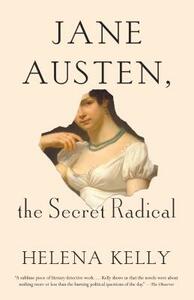Take a photo of a barcode or cover
Pros:
The Pride & Prejudice chapter is very good. I don't think it presents anything particularly revolutionary, but it was a good read and provides excellent context for modern readers, who mostly see it as a simple love story.
There is a lot of information scattered throughout the book which was new to me, and very interesting to learn. The context in which Jane was writing, the timeline of events, tidbits from her letters and newspapers - all fascinating.
Cons:
The tone is overwhelmingly condescending and unnecessarily dismissive of other biographers and researchers.
Far too many of the arguments are HUGE stretches. Seriously, claiming that Edward Ferrars is sexually violent because of the scissors? Knightley is a greedy proponent of enclosure who only marries Emma so he can take advantage of her father? Ridiculous. The author wants her work to be revolutionary, so she takes small details and claims they're huge revelations about how the characters we love are actually terrible people. I feel like the arguments wouldn't have passed in my freshman English classes, much less as advanced scholarly criticism.
Going along with the above, she literally claims that Cassandra killed Jane. At least the arguments presented above were about fictional characters and ultimately don't matter. But she seriously and directly argues that Jane only died because the doctor Cassandra called gave her laudanum, and - despite the fact that Jane herself already felt she was dying, and had been grievously ill for months - she would have lived another 40 or 50 years otherwise. SERIOUSLY. These are REAL PEOPLE you're talking about here, actual people who knew and loved Jane as a human being and not as a way to publish a book and make money. As there is no evidence to prove this (and Kelly doesn't even pretend that there is, she just makes an assumption and runs with it), this kind of accusation against long-dead relatives is cheap and in poor taste.
Conclusion: There is interesting information in this book, but it can probably be found elsewhere - and should be, to avoid your eyes rolling into the back of your head.
The Pride & Prejudice chapter is very good. I don't think it presents anything particularly revolutionary, but it was a good read and provides excellent context for modern readers, who mostly see it as a simple love story.
There is a lot of information scattered throughout the book which was new to me, and very interesting to learn. The context in which Jane was writing, the timeline of events, tidbits from her letters and newspapers - all fascinating.
Cons:
The tone is overwhelmingly condescending and unnecessarily dismissive of other biographers and researchers.
Far too many of the arguments are HUGE stretches. Seriously, claiming that Edward Ferrars is sexually violent because of the scissors? Knightley is a greedy proponent of enclosure who only marries Emma so he can take advantage of her father? Ridiculous. The author wants her work to be revolutionary, so she takes small details and claims they're huge revelations about how the characters we love are actually terrible people. I feel like the arguments wouldn't have passed in my freshman English classes, much less as advanced scholarly criticism.
Going along with the above, she literally claims that Cassandra killed Jane. At least the arguments presented above were about fictional characters and ultimately don't matter. But she seriously and directly argues that Jane only died because the doctor Cassandra called gave her laudanum, and - despite the fact that Jane herself already felt she was dying, and had been grievously ill for months - she would have lived another 40 or 50 years otherwise. SERIOUSLY. These are REAL PEOPLE you're talking about here, actual people who knew and loved Jane as a human being and not as a way to publish a book and make money. As there is no evidence to prove this (and Kelly doesn't even pretend that there is, she just makes an assumption and runs with it), this kind of accusation against long-dead relatives is cheap and in poor taste.
Conclusion: There is interesting information in this book, but it can probably be found elsewhere - and should be, to avoid your eyes rolling into the back of your head.
While I found many of the points made in this book interesting, especially those surrounding the idea that Austen *wanted* her readers to keep the issue of slavery in mind while she wrote Mansfield Park, I disagree strongly with much of the premise of the book. Primarily, I do not think "not as conservative as we have been led to believe," qualifies someone as radical. As someone who loves Austen books both in a recreational and an academic sense, I found many of her arguments flawed, and her review of the books influenced based on how much she liked the male protagonists (for instance, see her intense dislike of Colonel Brandon based on her belief he's not to be trusted for no other real reason other than Kelly doesn't like that he marries Marianne, which was baffling and distracting from some of her much more well-founded points in the Sense and Sensibility chapter). Another contention I had with many of her points is she is so hesitant to take Austen's words in her novels for what they are, and as a former English major the lack of clear textual evidence was annoying. Many of her ideas would be interesting as alternative retellings of the books, but as a compelling academic argument, I found it lacking.


